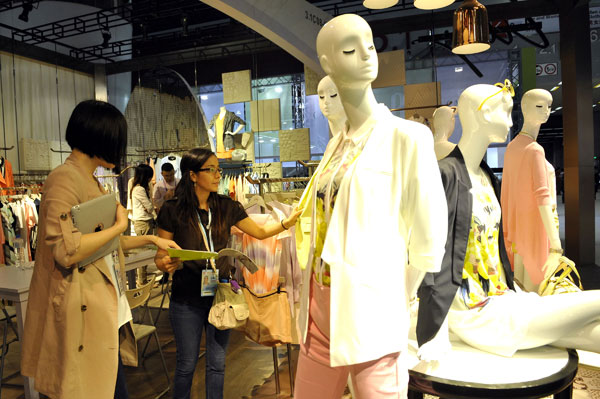Canton Fair to promote yuan use
|
 |
|
A buyer examines garments at the China Import and Export Fair in Guangzhou, Guangdong province. The fair, also known as Canton Fair, opens on Tuesday for its autumn session. Liang Xu / Xinhua |
Transactions during the China Import and Export Fair, the country's largest trade event, will be for the first time announced in the form of yuan settlement, organizers said on Monday.
"The move is part of an effort by the organizers to help accelerate the yuan's internationalization," said Liu Jianjun, spokesman for the fair and deputy director of the China Foreign Trade Center.
The 114th session of the twice-a-year fair, widely known as the Canton Fair, will open on Tuesday in Guangzhou, the capital of Guangdong province.
"Transactions conducted with yuan-denominated settlement will also help promote the yuan business of Chinese exporters during the fair. It will help avoid losses caused by a stronger yuan," Liu said.
The yuan strengthened to a 20-year high after the central bank set the currency's reference rate at a record high. The People's Bank of China raised its daily fixing by 0.08 percent to 6.1406 per dollar, the strongest since a peg to the greenback was lifted in July 2005.
A growing number of Chinese companies, such as Gree Electric Appliances Inc, one of the country's biggest home appliance manufacturers and exporters, have become keen on using yuan settlements.
"Yuan settlements in trade are welcomed, as they help avoid risks caused by the stronger yuan. We are going to use more yuan settlements in overseas markets," Zhang Zhenghu, deputy general manager of the overseas sales branch of Gree, told China Daily.
Guangdong-based Gree conducted its first overseas yuan-denominated deal, valued at $500,000, in Brazil in 2011, according to Zhang.
"Deals conducted using yuan settlement are still small for us. But we are going to promote more use of yuan payments in overseas markets in the years ahead, given that the value of the currency is still rising," Zhang said.
The stronger yuan, combined with a complex global trade situation, has squeezed profits for a growing number of Chinese companies, according to Zhang.
"Yuan appreciation is a heavy burden for most Chinese exporters. We had to increase prices to make a sustainable business profit in overseas markets," said Zhang.
Zhang Xialing, deputy director of the foreign trade department at the Ministry of Commerce, said at an earlier financing forum in Guangzhou that Chinese exporters need to conduct more deals using the yuan to avoid currency risks.



















